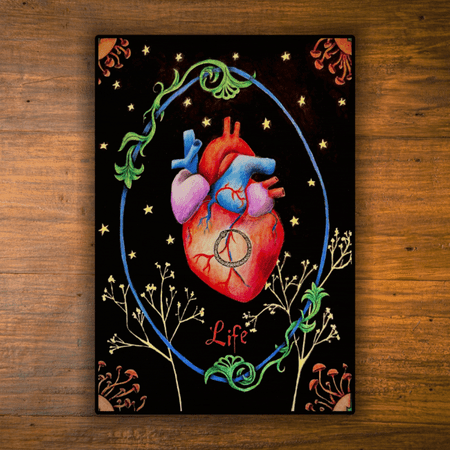
Jeremy Parsons writes songs like a man who has been sitting in the dark long enough to start hearing his own heartbeat. Life, his new five-song EP, isn’t dressed up in big arrangements or flashy choruses. Instead, it leans on the strength of its words—plain-spoken, confessional, often fragile in their vulnerability. Parsons isn’t interested in building mythologies. He’s trying to tell the truth. And in the pandemic-shaped silence that birthed these songs, that truth feels both intimate and communal.
The opener, “Tickin’,” builds itself around the most universal metaphor: time as the relentless clock. Plenty of writers have sung about the tick of mortality, but Parsons reshapes it into something more like a quiet sermon. “It’s not wasted if you choose to learn,” he sings, collapsing regret and redemption into a single line. It’s a lyric that acknowledges mistakes without dwelling on them, while also leaving space for listeners to imagine their own paths toward meaning. Time, in Parsons’ telling, isn’t an enemy. It’s a mirror.
“The Garden” grows from imagery as old as Eden and as personal as a family memory. Parsons’ father was a horticulturist, and the metaphor of planting and tending carries an authenticity beyond cliché. The chorus—“I hope that means you are too”—functions less like a refrain and more like a blessing. It’s not just about crops or flowers, but about thriving, about resilience. The language here is gently conversational, never ornate, and that simplicity is what gives the song its quiet grace. In an era when much songwriting leans on spectacle, Parsons trusts the listener to lean into patience.
The emotional anchor of the EP is “Who Was I,” a lyrical self-portrait of Parsons at 25, chasing highs and dead ends. “Sometimes I wonder who’s chasing who, me or the dream” is the line that lingers, a question asked in every green room, every apartment where a guitar leans against the wall gathering dust. Parsons’ words carry no glamour. They are heavy with the honesty of a man looking back and refusing to rewrite the past into something noble. By placing himself against the steady lives of his parents—“They prayed to Jesus and they finished out school”—he acknowledges both the distance and the strange kinship between generational choices.
With “Humanity,” Parsons expands his scope. The lyrics move from personal confession to cultural critique, decrying judgment and disconnection. “I saw that humanity was dying inside them / With no plan to save them from themselves” is blunt, but the bluntness is earned. The song is less an indictment than a lament, an acknowledgment of a world losing its empathy. Parsons admits his own limits—“I’ll be the first one to admit it / What’s so hard to understand”—and in doing so, his words resist the easy posture of the prophet. He’s part of the brokenness, and that’s why his plea carries weight.
https://www.youtube.com/watch?v=sq0xti_mYqo
The closing track, “Life Worth Dyin’ For,” distills the EP’s lyrical core: gratitude for the mess, acceptance of mortality, celebration of resilience. “I smiled and I laughed till I cried / Yeah I learned and I loved / Fallen and stood back up”—the catalog of experiences could read trite, but in Parsons’ voice it feels like testimony. The words aren’t dressed in metaphor, but they don’t need to be. Sometimes, truth is enough.
What Parsons offers with Life is not lyrical innovation so much as lyrical conviction. His words are straightforward, sometimes painfully so, but they cut because they are unguarded. In five songs, he turns autobiography into a mirror for the listener, reminding us that our own stories—our mistakes, our regrets, our endurance—are worthy of song.
–Annie Palmer
